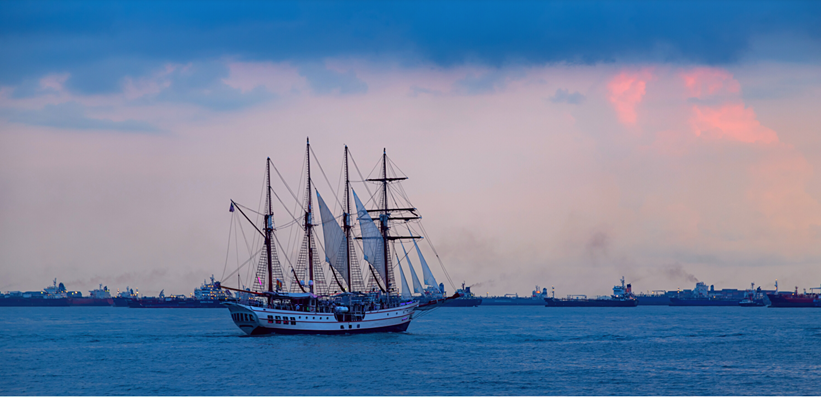D-ICE: Helping ships to reduce their carbon footprint

D-ICE
D-ICE is a French SME working on technological solutions to diminish the impact of boats on the environment.
The company is based in Nantes, with a team of 26 people, and operates in the fields of routing, clean energy and safety at sea. D-ICE assists ship owners and operators to find solutions to diminish their impact on the environment. In particular, they work on assessing the interest of adding wind-assisted ship propulsion systems onboard merchant ships.
The challenge
More than 3% of global carbon dioxide emissions can be attributed to ocean-going vessels, which is equivalent to the annual greenhouse gas emissions from over 205 million cars. Moreover, boats powered by fuel also cause noise pollution that negatively affects marine life.
The carbon dioxide emissions of ships are directly proportional to fuel consumption and speed. To reduce their environmental impact and to align with the objectives of the International Maritime Organization (IMO), the shipping industry is looking for solutions to reduce fuel consumption by using wind-assisted propulsion systems.
D-ICE decided to create systems to help ship operators to assess the interest of adding wind-assisted ship propulsion systems onboard their ships.
The satellite solution
Since 2020, D-ICE developed the SATORI software, an online service that estimates the fuel consumption of ships on specific routes. SATORI is particularly interesting to evaluate the performances of wind-assisted ship propulsion systems.
Initially funded by the Copernicus Marine Environment Monitoring Service (CMEMS), SATORI relies on data from Copernicus satellites to acquire information on weather, wind, waves and sea currents on sea routes. Those historical data are made freely available by the Copernicus Marine Environment Monitoring Service through two products: the Global Waves Reanalysis Waverys and the Global Ocean Physics Reanalysis.
The data are used to calculate ships’ motions and interactions with the environment. Indeed, the evaluation of wind, waves and currents is necessary for the model to calculate the speed of ships and their engine power between two points at a specific time.
The results
SATORI is built for shipowners, naval architects and providers of propulsion systems. Customers access SATORI through a web portal, where they can enter the ships’ data and their potential speed according to different directions and winds.
Users can perform statistical weather routing studies on the online interface, choose a route and the time periods on which they wish to assess the ships’ average consumption, and then create their own data visualisation to obtain the required forecasts (environmental conditions to be encountered, fuel saving associated with wind-assisted propulsion, ship motions).
SATORI has been already used by some notable skippers. For example, Total and Z&B are today using the software on some of their ships, while AYRO and Chantiers de l’Atlantique rely on it to design wind-assisted ship propulsion systems.
The same algorithm which powers SATORI was used to perform a study for the design team of the new Banque Populaire trimaran after their boat capsized during the Route du Rhum yacht race in 2018.
In 2021, the boat Maître Coq won the greatest sailing race around the world, solo, non-stop and without assistance: the Vendée Globe. D-ICE provided the skipper, Yannick Bestaven, with a software that contained a database of historical routes.
This database was computed with the same algorithm as SATORI. This tool helped him to confirm his routes’ choices and to eventually win the race.
“Thanks to this new technology, the shipping community can now validate business models around the new targets of the International Maritime Organization and take action to reduce greenhouse gases emissions globally”. Sylvain Faguet, D-ICE
Engineering.
